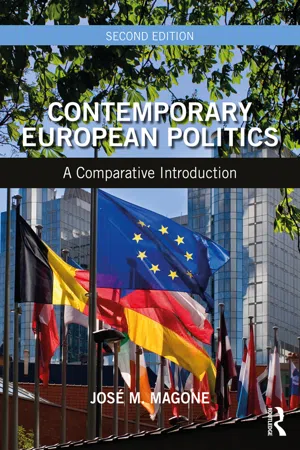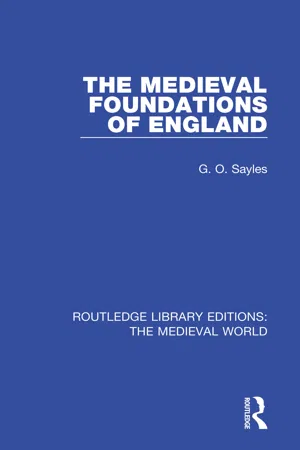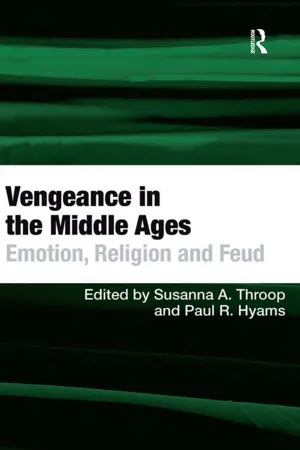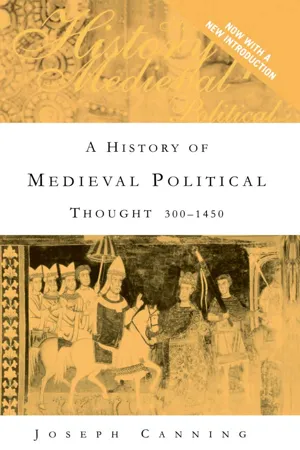Feudalism
Feudalism was a social and economic system that dominated medieval Europe, characterized by a hierarchical structure of land ownership and obligations. At its core, feudalism involved the exchange of land for loyalty and military service. The system was marked by decentralized power, with local lords holding authority over their territories and providing protection in exchange for labor and allegiance from their vassals.
6 Key excerpts on "Feudalism"
- eBook - ePub
Contemporary European Politics
A Comparative Introduction
- José M. Magone(Author)
- 2019(Publication Date)
- Routledge(Publisher)
...Frederick I had to acknowledge Alexander III and sign the Peace Treaty of Venice (1177) (Davies, 1988: 303–17). In spite of this victory of the papacy, the conflict between spiritual and temporal power continued throughout the Middle Ages. Feudalism was the main social structure during the Middle Ages, becoming an intrinsic part of the emerging nation-states of Europe. It was characterised by a hierarchical and static system of personal dependency relationships, and with a specialised military class occupying the higher levels of society with privileged rights. Moreover, political authority was dispersed among a hierarchy of persons who exercised in their own interest powers normally attributed to the State and which were often, in fact, derived from its break up (Ganshof, 1964: xv). The last feature, related to the dispersal of political authority among a hierarchy of persons, had at its top the king or emperor. In most countries, the monarchy had to share power with its vassals, but in the Late Middle Ages France, Spain, Portugal and England were able to establish more advanced political structures that allowed the establishment of a fledgling nation-state. It is probable that the most centralised feudal system could be found in England, because at that time, following the Norman invasion by William the Conqueror in 1066, all land belonged to the king, and so all lords were vassals of the monarchy. The establishment of assemblies that allowed the most important estates to be represented can be regarded as the origins of parliamentarianism in Europe. The most developed such assembly was likely to have been the English parliament (Finer, 1999: 1336). The system of justice was also ad hoc, fragmented and based on customary law. It was separated from the feudal structure, although the respective lords and vassals sat in these courts. The structures became more sophisticated at the end of the Middle Ages...
- eBook - ePub
- Harald Kleinschmidt, Harald Kleinschmidt(Authors)
- 2017(Publication Date)
- Routledge(Publisher)
.... 21 While there are no profound differences between this definition by Weber and the fuller "description" contained in Feudalism in History, Weber has couched his statement in more general and structural terms. Furthermore in other portions of his analysis of authority he provides criteria which make it possible to place Feudalism in context with other political systems such as patrimonial government and bureaucracy. One of the most elegantly simple definitions of Feudalism is in actuality one of the oldest and reflects the particular legal biases of F. W. Maitland. According to Maitland, Feudalism was "a state of society in· which all or a great part of public rights and duties are inextricably interwoven with the tenure of land, in which the whole government system—financial, military, judicial—is part of the law of private property". 22 Such a conception neatly draws together the relationship of land rights and political authority, but it misjudges the extent of private authority permissible in a non-contractual society. One of the chief characteristics of the feudal system was the very non-existence of private property as such, for there was no possession free and clear without reciprocity. For this reason it would be better to reverse Maitland's proposition so as to emphasize the submersion of private rights within the government system. 23 While Weber and Maitland stress governmental relationships in Feudalism, the sociologist is more in need of a definition which clarifies the social structure of Feudalism...
- eBook - ePub
- G.O. Sayles(Author)
- 2019(Publication Date)
- Routledge(Publisher)
...But the nearer society came to collapse, the faster the processes towards Feudalism worked. The tenth century saw the feudal régime: the rule of lords or ‘seigneurs’, the presence of innumerable small lordships, self-contained, independent, intensely jealous of their neighbours and conducting private war against them. But when the Scandinavian and the other menaces were past, the feudal regime was gradually pruned of its excesses and it was bound to the observance of specified regulations, and there came out of it that structure of society, to which modern historians have given the general descriptive term of ‘Feudalism’. Nevertheless, the notion of sovereignty did not altogether vanish. In fact, it found a place for itself within the very scheme of Feudalism: the perfect pyramid must have an apex where there is room for one and one only. The king was in feudal practice the ‘lord of lords’, the general lord of the kingdom: it was Feudalism itself which kept him paramount in unique isolation until he was strong enough to discard it. Moreover, the kingly office remained an institution supported by divine sanctions for the furtherance of divine purposes. These conceptions were never questioned throughout the Middle Ages, and therefore monarchy stayed pre-eminent in the feudal world which had formed beneath it. It is true that in practice it had become paralysed and shorn of most of its power. Nevertheless, it still retained within its armoury for use at an appropriate time the weapon of the ‘prerogative’: it had not lost all interest in the lands it had given to others, for it could claim that it still possessed all the political rights which it had not very specifically given away. Therefore monarchy will eventually grow again in strength in the very midst of Feudalism by developing political forces which were older than Feudalism and which had never been eliminated...
- eBook - ePub
The Collected Works of Georg Wilhelm Friedrich Hegel. Illustrated
The Phenomenology of Spirit. The Logic of Hegel. Hegel's Philosophy of Mind
- Georg Wilhelm Friedrich Hegel, J. B. Baillie, William Wallace, S. W. Dyde, F. P. B. Osmaston, J. Sibree, Elizabeth Sanderson Haldane, Ebenezer Brown Speirs(Authors)
- 2021(Publication Date)
- Strelbytskyy Multimedia Publishing(Publisher)
...Feudal sovereignty is a polyarchy: we see nothing but Lords and Serfs; in Monarchy, on the contrary, there is one Lord and no Serf, for servitude is abrogated by it, and in it Right and Law are recognized; it is the source of real freedom. Thus in monarchy the caprice of individuals is kept under, and a common gubernatorial interest established. In the suppression of those isolated powers, as also in the resistance made to that suppression, it seems doubtful whether the desire for a lawful and equitable state of things, or the wish to indulge individual caprice, is the impelling motive. Resistance to kingly authority is entitled Liberty, and is lauded as legitimate and noble when the idea of arbitrary will is associated with that authority. But by the arbitrary will of an individual exerting itself so as to subjugate a whole body of men, a community is formed; and comparing this state of things with that in which every point is a centre of capricious violence, we find a much smaller number of points exposed to such violence. The great extent of such a sovereignty necessitates general arrangements for the purposes of organization, and those who govern in accordance with those arrangements are at the same time, in virtue of their office itself, obedient to the state: Vassals become Officers of State, whose duty it is to execute the laws by which the state is regulated. But since this monarchy is developed from Feudalism, it bears in the first instance the stamp of the system from which it sprang. – individuals quit their isolated capacity and become members of Estates [or Orders of the Realm] and Corporations; the vassals are powerful only by combination as an Order; in contraposition to them the cities constitute Powers in virtue of their communal existence. Thus the authority of the sovereign inevitably ceases to be mere arbitrary sway...
- eBook - ePub
Vengeance in the Middle Ages
Emotion, Religion and Feud
- Paul R. Hyams, Susanna A. Throop(Authors)
- 2016(Publication Date)
- Routledge(Publisher)
...Similarly, the excessive value placed on personal honor at that time should not be used as evidence for a lack of public order and justice. Vassalage and the fief were very much institutions allied with war. In the Frankish region between the Loire and the Rhine, and the Aquitaine of Gerald of Aurillac, castles existed and were fought over as early as the tenth century, and acts of violence occurred that greatly resembled those in the year 1000. 3 Vassals were supposed to avenge their lord; if they had done so faithfully, war would have been everywhere and it should have been impossible to stop them, or excuse them. 2 Karl Ferdinand Werner, Les origines (avant l’an mil) (Paris, 1984), pp. 431–96, esp. pp. 432–6, where anarchy is judiciously refuted, but where at the same time all allusion to knightly brutality disappears. Olivier Guillot, “Formes, fondements et limites de l’organisation politique en France au Xè siècle,” in Il secolo di ferro: mito e realtà del secolo X (Settimane di studio del Centro italiano di studi sull’alto medioevo.38, 1991), Tome I, pp. 57–116. 3 As Paul Hyams rightly notes: “Homage and Feudalism_ A Judicious Separation,” in Natalie Fryde, Pierre Monnet and Otto Gerhard Oexle (eds), Die Gegenwart des Feudalismus. Présence du féodalisme et présent de la féodalité. The Presence of Feudalism (Göttingen, 2002), pp. 13–49. According to Guizot—the phrase is well known—the “feudal regime” resembled “less a society than a war.” 4 Was it not rather that the phenomenon of war resembled society? Sociology has helped us to pay more attention to the social arrangements between adversaries, and to the codes and purposes that governed violence. Moreover, although not all in that society, or in that war, should be considered “feudal,” nevertheless clear feudal elements such as homage and the fief played a certain role that it would be wrong to deny. The crucial point is that these elements did not exist alone and they had their exact place in society...
- eBook - ePub
- Joseph Canning(Author)
- 2014(Publication Date)
- Routledge(Publisher)
...But there is a huge linguistic challenge involved. There is a marked shortage of scholars equipped with Latin, Greek and Arabic to make possible a deepened comparative study of western and Islamic political thought in the Middle Ages. FEUDAL CONCEPTS The debate continues about one of the basic conceptual tools for understanding the Middle Ages – feudal relations and the contentious term, Feudalism. In my book, I did seek to indicate the conflicting approaches to this topic but was unable to give proper attention to a work which only became known to me in the final stages of writing. Susan Reynolds, Fiefs and Vassals: The Medieval Evidence Reinterpreted (Oxford: Oxford University Press, 1994) elaborates a thesis relevant to medieval political thought: that concepts of fief and vassalage used by medieval historians were developed by sixteenth-century jurists interpreting the works of late medieval ones, the result being a mental construct divorced from reality. JURISTIC WORKS Jurists occupied a central place in the development of medieval political thought because of their concerns with government and rulership within systems of justice. My book reflected the importance of their works. The medieval jurists from the late eleventh century onwards made fundamental contributions to the two main aspects of political thought: the normative and evaluative side (as shown, for instance, in notions of the common good and justice), and also the empirical (as revealed in their application of the principles of law to their contemporary political reality). It is becoming increasingly clear that their nuanced development of the de iure/de facto argument is attaining classic status within political theory (see below, pp. 169–170). In the preface to my book, I acknowledged my debt to Walter Ullmann and considered his interpretations in the body of the text. I think it might be helpful to clarify my position on Ullmann...





